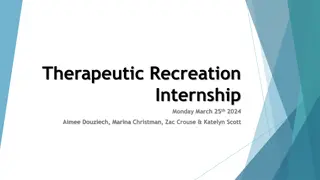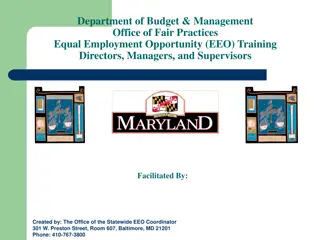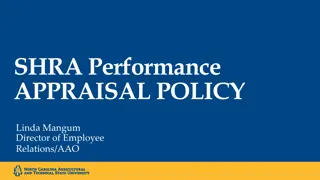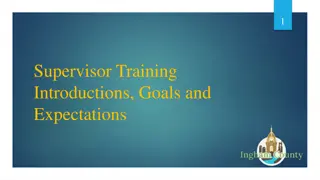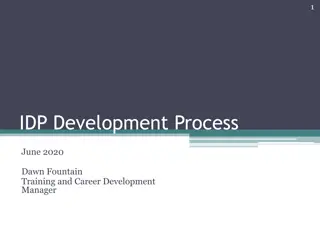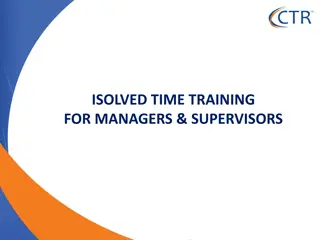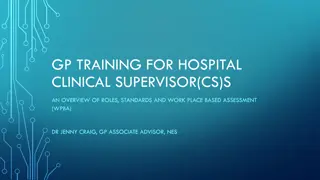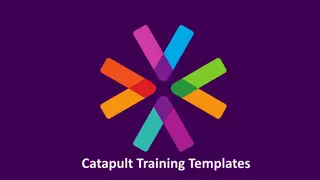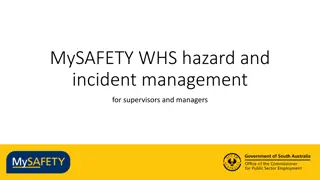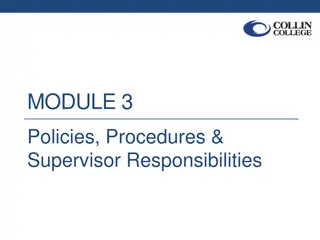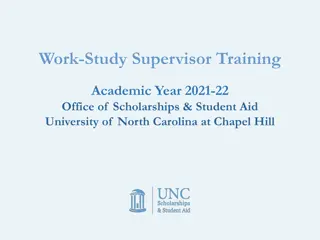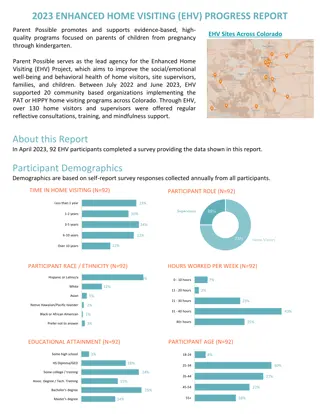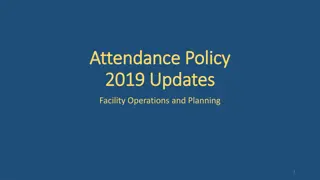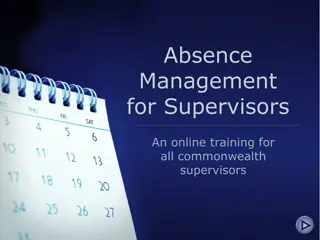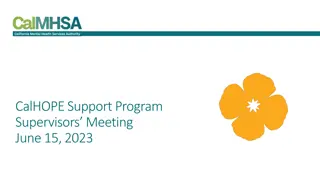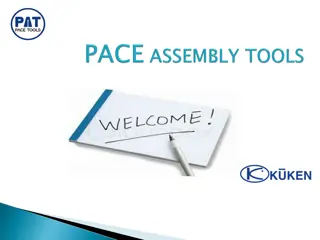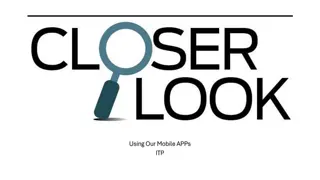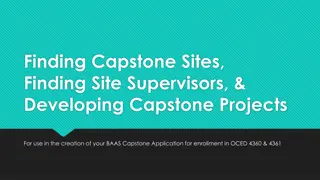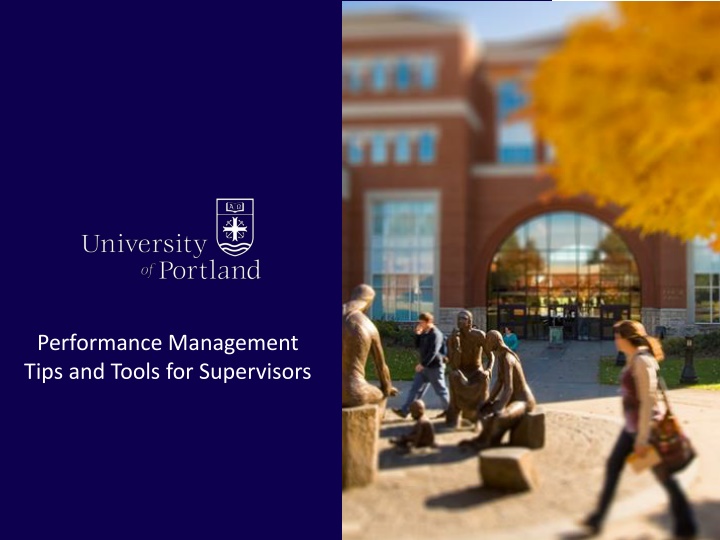
Effective Performance Management Strategies for Supervisors
Enhance your supervisory skills with practical tips on managing employee performance, conducting 1:1 meetings, tracking performance data, and more. This training aims to empower supervisors with the tools they need to address performance issues effectively and know when to seek HR support.
Download Presentation

Please find below an Image/Link to download the presentation.
The content on the website is provided AS IS for your information and personal use only. It may not be sold, licensed, or shared on other websites without obtaining consent from the author. If you encounter any issues during the download, it is possible that the publisher has removed the file from their server.
You are allowed to download the files provided on this website for personal or commercial use, subject to the condition that they are used lawfully. All files are the property of their respective owners.
The content on the website is provided AS IS for your information and personal use only. It may not be sold, licensed, or shared on other websites without obtaining consent from the author.
E N D
Presentation Transcript
Performance Management Tips and Tools for Supervisors 1
Course Objectives Provide supervisors with practical tools and methods for effectively managing employee performance Help supervisors to understand when they should reach out to HR for assistance with employee performance issues Many of you attended one of our previous sessions that provided an overview of performance management at UP. That training covered how and when to provide performance feedback, an overview of the annual performance process and when to use performance improvement plans (PIPs). 2
Todays training will focus on: How to conduct weekly 1:1 meetings with your team members How to keep track of employee performance information Warning letters and performance improvement plans How to conduct supervisory investigations Questions about today s focus? 3
Weekly 1:1 Meetings How many of you hold weekly (or other interval) 1:1 meetings with your team members? What topics do you discuss? Do you use set meeting agendas? How do you keep track of projects and other work done by your team members? 4
Weekly 1:1 Meetings Tips: Think about what you want from the meetings Decide whether you want to use a fixed agenda (recommended) You may want the employee to create the agenda Tools: Advisable to use some form of project/work tracking tool Have staff person manage tool and bring to each meeting Serves as discussion tool Allows for management and documentation of priorities Can be used to inform performance evaluations 5
Keeping Track of Employee Performance A project tracking tool is one way to accomplish this, but what if you have concerns about things like absenteeism or tardiness? You can create and keep a log: Excel spreadsheet Notes on your Outlook or other electronic calendar Other ideas? Goal is to use a tool where you can document absenteeism or tardiness, etc. Doing so will help to detect patterns of behavior and help store documentation that you can use in performance discussions 7
Keeping Track of Employee Performance Tip: Keep discussions around absenteeism or tardiness performance focused (e.g. the negative impact the behaviors are having projects, daily business operations, productivity, etc.) Why? Tip: It is OK to ask if there is something wrong or going on that is causing the problem A tracking tool can also be used to track significant accomplishments and/or failures. 8
Warning Letters and PIPs CAUTION AHEAD! No warnings or PIPs should be issued without first consulting with HR!! 9
Warning Letters and PIPs About verbal warnings Should discuss with HR before delivering Verbal warnings should be followed by an email to the staff person confirming the verbal warning was provided, the basis for the warning, expectations created and that, Further disciplinary action up to and including termination may occur if improvement is not achieved Keep a copy for your files 10
Warning Letters and PIPs Written Warnings Generally issued after informal counseling or verbal warnings do not foster improved performance It is not necessary in all cases that a verbal warning precede a written warning Can you think of any situations where this might be the case? Provide a copy to the employee Keep a copy for your files Scan and forward a signed copy to HR 11
Warning Letters and PIPs Performance Improvement Plans PIPs do not replace managers responsibilities for providing timely, honest and ongoing informal and formal performance feedback! PIPs are used to provide a clear, measurable written road map of expectations and deliverables when other methods have failed to produce necessary improvement in an employee s performance Generally used as the tool of last resort! 13
Warning Letters and PIPs Performance Improvement Plans PIPs do not replace managers responsibilities for providing timely, honest and ongoing informal and formal performance feedback! PIPs are used to provide a clear, measurable written road map of expectations and deliverables when other methods have failed to produce necessary improvement in an employee s performance Generally used as the tool of last resort! 14
Warning Letters and PIPs Performance Improvement Plans Should: Clearly indicate the area of performance or competency that is not meeting expectations Describe the observed behaviors the employee is exhibiting that are not meeting expectations. Be Specific! Articulate the required/desired behaviors Describe the measures (outcomes) by which performance against the PIP will evaluated Set a schedule for providing employee with feedback on their progress/performance against the PIP (stick to your commitment to provide feedback!) Set time frame for PIP, sustained improvement, consequences for insufficient improvement 15
Warning Letters and PIPs Performance Improvement Plans KISS (Keep It Simple, Stupid)* Use job description and position leveling criteria to isolate/identify areas for improvement No more than three areas for improvement in PIP Employee needs to show sustained improvement in areas identified in PIP PIP needs to have an articulated timeframe for improvement and should not be open-ended Manager may choose to: Extend PIP timeframe End PIP early if employee not making necessary progress *E.B. White and William Strunk, The Elements of Style, 1920 16
Supervisory Investigations Class Exercise Scenario: Joe has always been an employee who arrives to work on time and gets his work done in a thorough and efficient manner. Lately, Joe has been arriving 15-45 minutes late a few times each week. He is not giving you advance notice. His work is not getting done in time or in a quality manner. You have now become annoyed with Joe s tardiness and him not getting his work done to the point where you are taking work off of his plate and assigning it to others. Joe s teammates are beginning to express unhappiness about having to pick up Joe s slack. 20
Supervisory Investigations Instructions: Break into teams of 4 Each team will take 10 minutes to determine: 1. How you are going to communicate your concerns to Joe (e.g. 1:1, phone, email, etc.)? 2. What information do you need from Joe? 3. What you will communicate to Joe and how? 4. What outcome you are seeking? 5. How you will document your interactions with Joe? Take 10 minutes to develop your answers and be prepared to share with the group 21
Supervisory Investigations Reach out to HR for guidance This type of investigation is used to get to root causes and knowledge to make fair determinations Used to validate or invalidate supervisor s assumptions about why performance issues are occurring Not to be confused with workplace investigations involving misconduct, harassment or discrimination 22
Supervisory Investigations Tools: Human Resources! You should always reach out to HR for guidance on how to handle performance issues Tips: Always meet with the employee as soon as a performance issue is detected. Dealing with small problems is easier than dealing with big problems! Remember to: Focus on the behaviors, not the person Describe the action taken or not taken Describe the impact of the action or behaviors 23
Supervisory Investigations Tips: Always meet with the employee as soon as a performance issue is detected. Dealing with small problems is easier than dealing with big problems! Remember to: Ask the employee to help you understand what is Causing the actions or behaviors-Don t assume Engage the employee in discussion of alternative actions or behaviors that will achieve the desired outcomes. Make the desired outcomes measurable Confirm the understanding in writing Avoid tendency to take work away 24
QUESTIONS? 25
Performance Management at University of Portland 26


